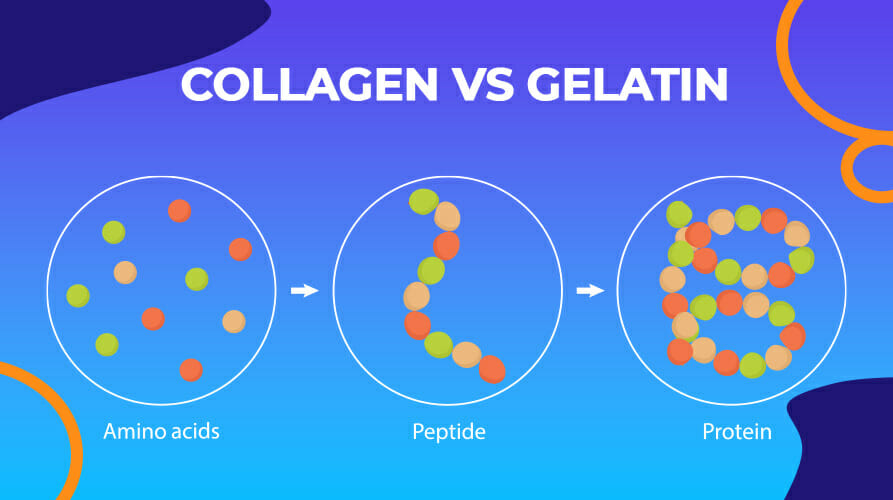Collagen vs gelatin- wondering what is the difference between the two? Let us get it straight. Both have similar nutritional profiles but are used very uniquely. Know which one is better for you.
What is collagen?
Collagen is a profusely found compound present in our bones, ligaments, tissues, and muscles. It is like glue that holds all different body parts together. Thus, collagen is called the connective tissue protein.
However, with time our natural collagen declines. And our body requires it from external sources. It can be extracted from cows, fish, chicken, etc. and comes in various forms. In fact, one such type is gelatin.
What is gelatin?
Gelatin is a by-product of collagen. Much like it, it is also composed of amino acids. When collagen is heated or treated with chemicals, the amino acid chains break down and form gelatin. The gelatin obtained during this process is colorless and flavorless. When mixed in hot water, it takes on a jelly-like shape. Gelatin is often used in making jelly and gummy candies. Thus, it can be used as both jelly and a supplement.
Collagen vs gelatin: Nutritional value
The nutritional profile of collagen vs gelatin is quite similar. Both are made of protein and amino acids. But gelatin lacks some amino acids as it is the degraded form of collagen. They both share the same calorie quotient. However, some gelatin products contain added sugar and artificial flavors, making them less healthy. Some foods containing gelatin are jelly, candy corn, marshmallows, trifles, etc.
Collagen vs gelatin: Major differences
1. When it comes to treating collagen, it can be broken down into either hydrolyzed or partially hydrolyzed collagen. Hydrolyzing means that collagen peptides are further broken down into small chains of amino acids to make them easier to absorb.
A fully hydrolyzed collagen is called collagen peptides whereas partial ones are referred to as gelatin.
2. Hydrolysis uses small enzymes and high-pressure to become peptides. The smaller molecules are more bioactive, meaning your body can absorb them in a few hours.
Whereas when the collagen is heated to make gelatin, its protein begins to unknot. The process is called denaturing. It is not entirely broken down into smaller amino acids and hence, is not relatively easier to digest.
3. A plus point of collagen is that it can be dissolved in hot and cold water. But gelatin is insoluble in cold water. It can only be mixed with hot liquid. When cool down, gelatin thickens into a gel and can be added to various desserts. Collagen lacks gelling properties.
4. Collagen supplements are generally high-quality and thus, are expensive. Gelatin is cheaper to make. The quality may differ. It’s best to read the label to find out more information.
Collagen vs gelatin: Which one should you choose?
The debate between collagen vs gelatin comes to an end. More or less both collagen and gelatin offer similar benefits. They both improve joint and bone health. Being fat-free, they also help to lose weight. Added benefits include improved hair thickness, stronger nails, increased muscle mass, etc.
Collagen is also hailed as a beauty booster. It is more popularized in the skincare and beauty industry. As they enhance skin texture, replenish lost moisture, and increase firmness.
Since gelatin is used in jellies and candies, it is often overlooked as a supplement. But it’s not like you will not see results with gelatin. But it may impact your digestive system. Plus, collagen is trusted and employed in various health supplements. It is comparatively a safer option. You can always go for a hydrolyzed collagen peptide and enjoy its benefits.
Not sure about the benefits of collagen? Check out our article on the benefits of collagen, risks, and more.
